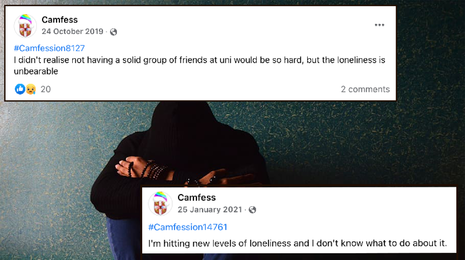Camfess: blessing or burden for student mental health?
Camfess has helped countless students struggling with loneliness. But should students have to rely virtual peer support when they’re in need?

Content warning: Brief mention of depression, loneliness and suicidal thoughts
It’s 2 am and Jess is sitting in her room, on her phone, feeling utterly alone. So she turns to Camfess: “I don’t think people realise how much loneliness hurts…I don’t know how to make it go away or how to fix it. Idk why I’m even writing this, it just hurts so much”.
The advent of anonymous Facebook pages have changed the shape of loneliness at Cambridge. Scrolling through the page, you’ll see posts from students about suicidal ideation, depression, and loneliness appear weekly, and below each posts commenters advise, signpost and offer their own experiences as replies. Jess told me: “Camfess helped me, I didn’t have anyone else to talk to.”
The page’s administrators, also students, acknowledge the importance of these comment sections, one saying they “try to post as many mental health posts as possible” because they end up being “useful resources.” Student Minds Cambridge even advertised a role titled ‘Camfess Responder’ dedicated to “ensure that no post indicating a student is suffering with their mental health goes unanswered.”
But there are costs to this peer-to-peer support system. One admin said that you can’t know the full story from a single Facebook post, “so we advise people to generally not rely completely on advice from Camfess comments.”
Administrating the page also takes a burden on those tasked with running it.
The past two years of Covid overwhelmed the page. “[During covid] the negative submissions started to outweigh the positive ones. Camfess admins had to take a break for the sake of our own mental health.”
When anonymous Facebook posts are the only resource for students struggling, it’s a sign that their university is failing them.
The peer-to-peer support system offered by the Camfess community is quicker, and less intimidating to access than the University’s counselling service, which often takes weeks to offer students an appointment, and only operates between the hours of 9:00-17:00.
Porters and tutors are offered by colleges as “out-of-hours” support. Ben Dalitz, SU Welfare and Community officer, said “the reason students have to turn to somewhere like Camfess is because there isn’t good enough structural support.”
The only out-of-hours support offered by colleges are porters, who are often ex-police, or ex-military, whilst playing a vital role in student safety, don’t have a background in mental health.
Ben argues “loneliness” shouldn’t be a normalised part of studying at Cambridge. Camfess provides a community of a kind, but it shouldn’t replace real life-support, Ben says: “It’s great that it exists, but it shouldn’t ever be something people have to rely on.”
A University spokesperson told Varsity: “Academic pressure at Cambridge can be a challenge for every student. Having the courage to discuss your issues openly with friends and family can be a helpful strategy for managing emotions. Students can access a range of support from their Colleges and the University.”
 News / Hundreds of Cambridge academics demand vote on fate of vet course20 February 2026
News / Hundreds of Cambridge academics demand vote on fate of vet course20 February 2026 News / Judge Business School advisor resigns over Epstein and Andrew links18 February 2026
News / Judge Business School advisor resigns over Epstein and Andrew links18 February 2026 News / University Council rescinds University Centre membership20 February 2026
News / University Council rescinds University Centre membership20 February 2026 News / Petition demands University reverse decision on vegan menu20 February 2026
News / Petition demands University reverse decision on vegan menu20 February 2026 News / Caius students fail to pass Pride flag proposal20 February 2026
News / Caius students fail to pass Pride flag proposal20 February 2026










